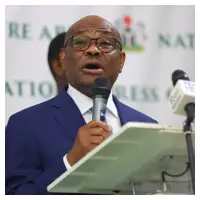The Network for the Actualisation of Social Growth and Viable Development (NEFGAD) has strongly criticized Minister of Works, Engr. David Umahi, for attempting to present a mere 30-kilometre segment of the Lagos-Calabar Coastal Highway as ready for commissioning.
In a statement signed by its country head of office, Mr. Akingunola Omoniyi, the public procurement advocacy group expressed deep concern over what it described as a premature and misleading move, noting that the commissioned portion represents just 4 percent of the entire 750-kilometre infrastructure project.
"We caution against the politicization of infrastructure delivery and stress that project commissioning should reflect substantive completion and usability of the project in its entirety or at least a major functional section," NEFGAD stated.
The group warned that such actions could set a dangerous precedent if left unchecked, potentially normalizing the commissioning of incomplete projects across Nigeria and reducing significant national infrastructure milestones to "mere photo opportunities and political theater."
Government Continuity Concerns
NEFGAD emphasized that President Bola Tinubu should not be pressured into commissioning unfinished projects, reminding the Works Minister that government is a continuum. The group pointed out that Tinubu himself had completed and inaugurated projects initiated by previous administrations.
"The minister, Umahi, should know that it is not possible for an administration to finish the business of government to the extent of thinking that all projects initiated must be completed during a tenure," the advocacy group observed.
The Lagos-Calabar Coastal Highway is designed as a transformative infrastructure corridor spanning Nigeria's coastal region. Earlier statements from the Ministry of Works had indicated the project would be completed by January 2026 and is designed to withstand flooding for 50 years.
Call for Accountability
NEFGAD called on President Tinubu to demand transparency and accountability in project delivery, stating that Nigerians deserve full value for public infrastructure initiatives rather than "staged ceremonies that paper over incomplete work."
"We urge the Ministry of Works to recommit to credible milestones, uphold project integrity, and ensure that future commissionings are tied to real, completed achievements—not fragments dressed up as finished products," the statement concluded.
This criticism comes amid growing concerns about infrastructure project management and transparency in government spending under the current administration.













